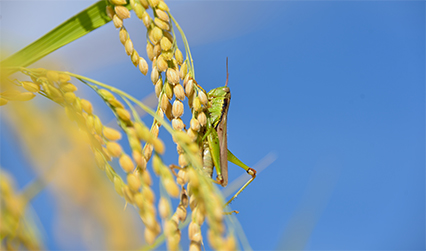How we beat back the locust plague
The year 2020 was a tough one. It was the year that the Covid-19 pandemic ravaged the world and disrupted livelihoods in a major way: healthcare systems were overstrained, and the food supply chain systems were disrupted like never before. And then came one more pest: Locusts!

Our entire donation, valued at approximately Ksh 100 Million; 70 Million in Kenya and 30 Million in Uganda excluding freight, enabled the two governments to treat 170,000 hectares of the most affected fields. Through this donation, we focused on support to vulnerable smallholder farmers who are so critical to food security and essentially contributing to our shared vision of a future where Health For All, Hunger For None is made possible.
In East Africa, the economic effects of the pandemic were worsened by a terrible invasion of the destructive desert locusts that were sweeping the agricultural fields clean of any green vegetation.
The swarm composing billions of these locusts presented an extremely alarming and unprecedented threat to food security and livelihoods. More than 10 million people in Eastern Africa countries faced acute food insecurity directly due to the disastrous plague.
According to the Food and Agriculture Organization (FAO), this was the worst invasion in 70 years.
Keen to provide a solution and cushion the farmers and the people of East Africa against a looming hunger crisis, we at Bayer stepped in and provided a lasting solution.
Watch the documentary: ‘The swarm that almost won’ which tells the story of our purpose as a company. With a focus on the support to the governments of Kenya and Uganda in the fight against the locust invasion, the result was one of great collaboration between our Bayer Global and Africa Crop Science teams. Together we collaborated to have the deltamethrin pesticide produced in France and shipped to Kenya and Uganda within record time.